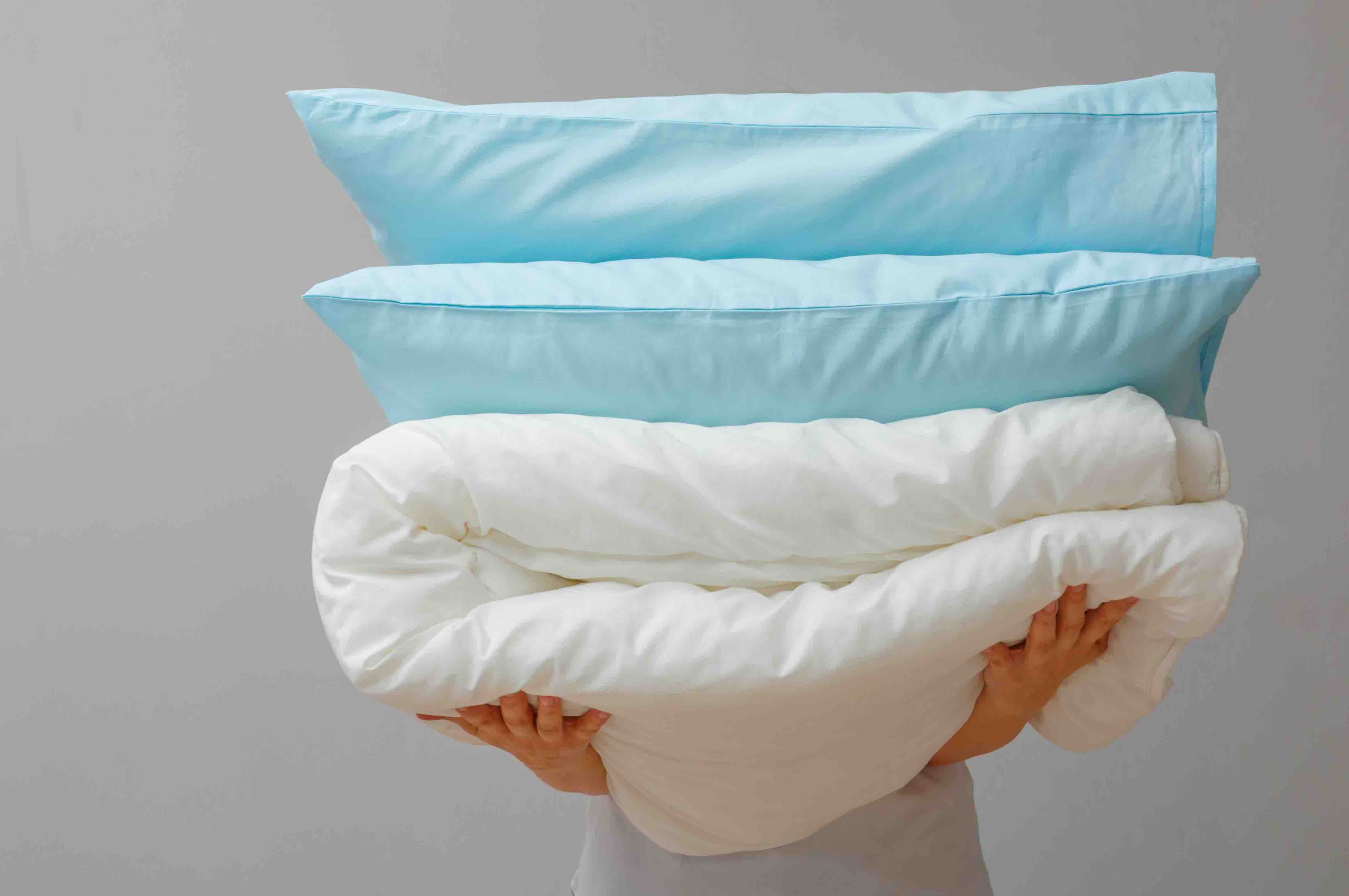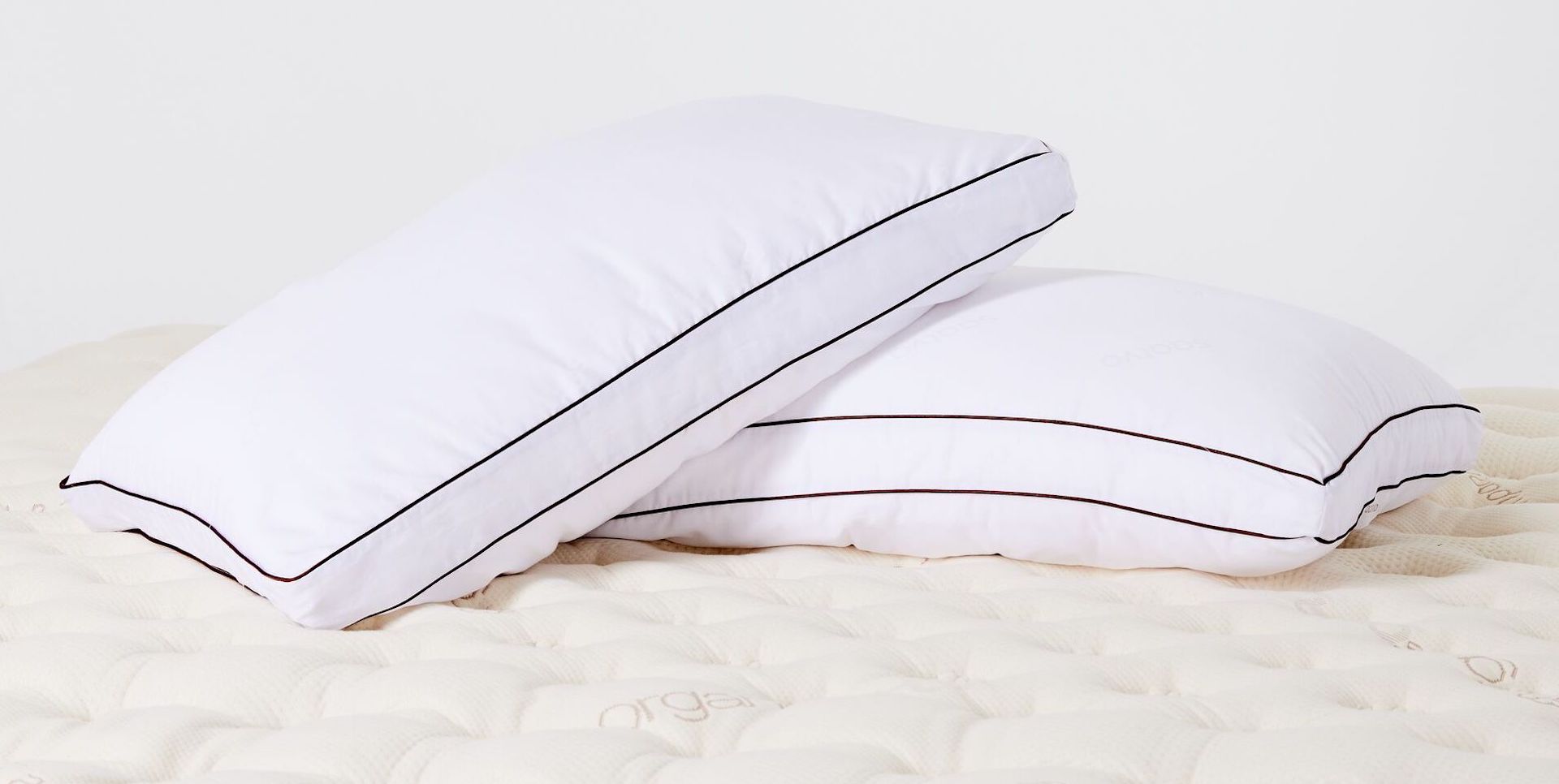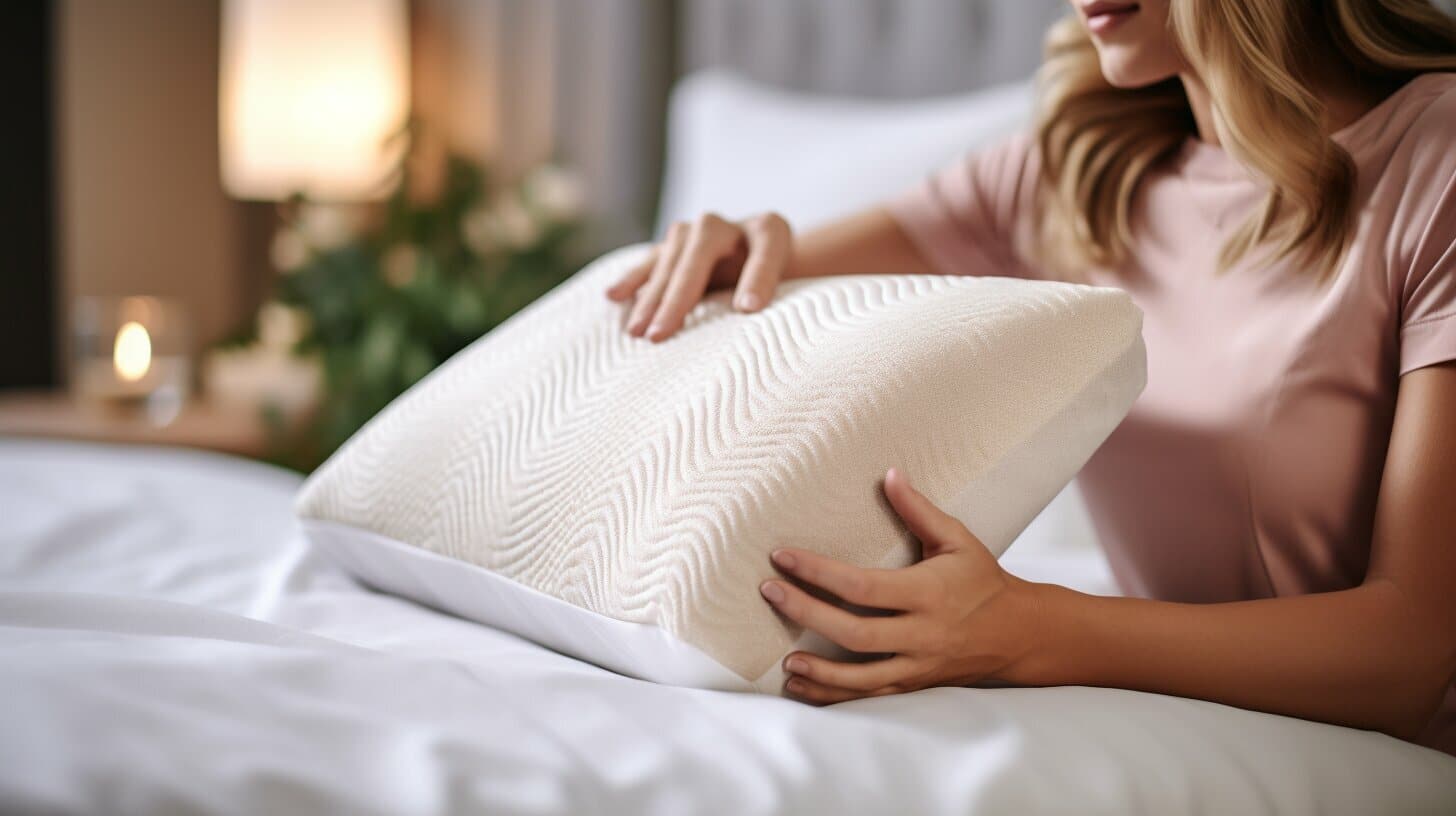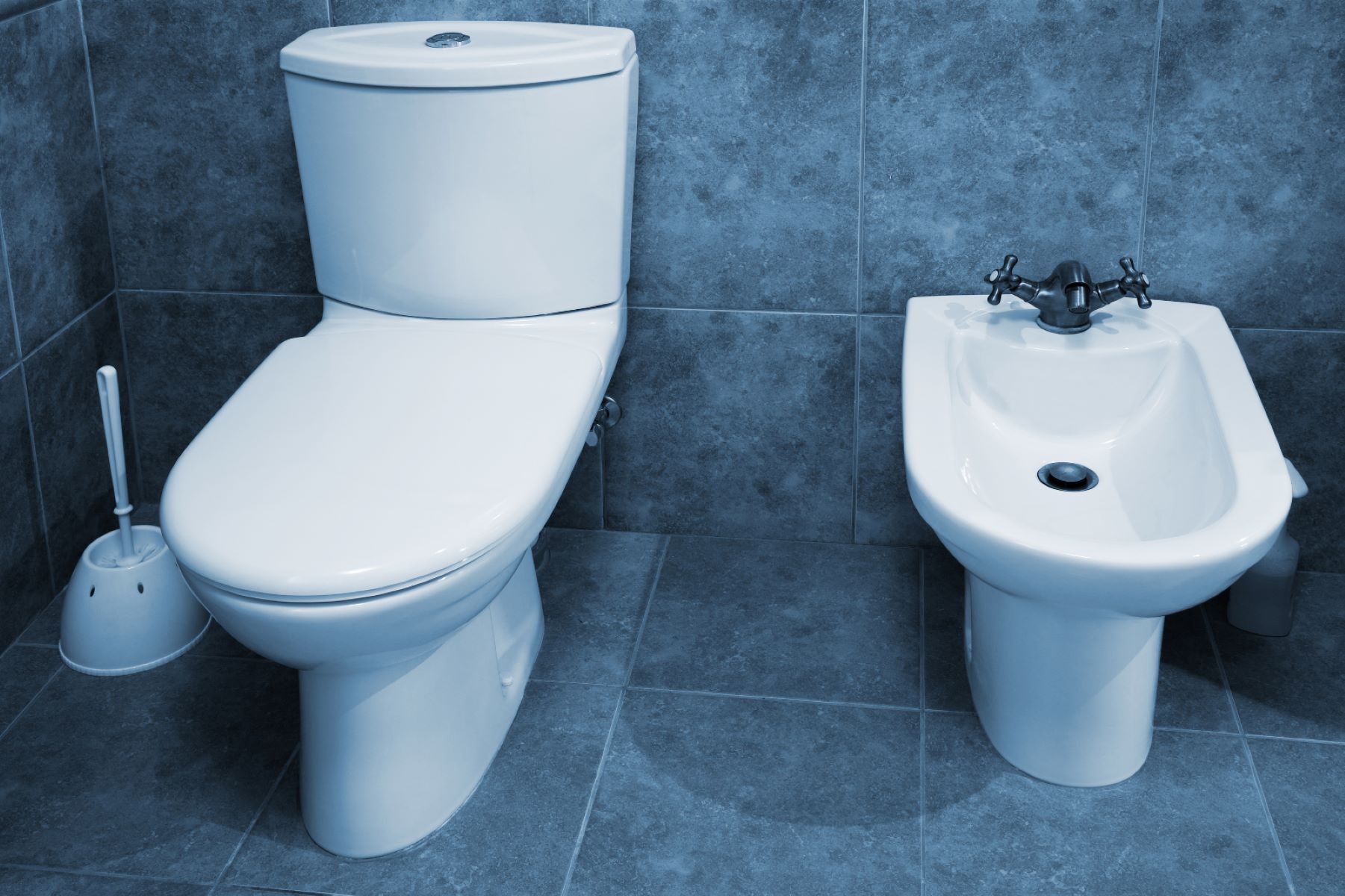

Articles
How To Choose Pillows
Modified: October 20, 2024
Looking for articles on how to choose pillows? Discover expert tips and advice on selecting the perfect pillows for a good night's sleep.
(Many of the links in this article redirect to a specific reviewed product. Your purchase of these products through affiliate links helps to generate commission for Storables.com, at no extra cost. Learn more)
Introduction
When it comes to getting a good night’s sleep, the importance of choosing the right pillow cannot be overstated. Your pillow plays a crucial role in supporting your neck and spine, ensuring proper alignment, and providing comfort throughout the night. Sleeping on the wrong pillow can lead to neck pain, stiffness, and even affect the quality of your sleep.
In the vast world of pillows, there are numerous options to choose from, each offering unique benefits for various sleep preferences and needs. Whether you prefer a soft and fluffy pillow or a firm and supportive one, understanding the key considerations for selecting the perfect pillow can make all the difference in your sleep experience.
This article will guide you through the process of choosing the right pillow, taking into account factors such as pillow filling options, thickness, size, firmness, and support. We will also explore how to assess your sleeping position and address specific sleep needs to ensure you find the pillow that suits you best.
Additionally, we will provide tips on pillow care and maintenance to extend their lifespan and keep them clean and fresh for optimal sleep hygiene.
By the end of this article, you will have a comprehensive understanding of how to select the ideal pillow that will help you achieve that highly sought-after restful slumber.
Key Takeaways:
- The right pillow can significantly impact sleep quality, spinal health, and overall well-being by providing proper alignment, support, and comfort tailored to individual sleep preferences and needs.
- Understanding pillow filling options, thickness, size, firmness, and support, along with proper care and maintenance, is essential for selecting the ideal pillow that promotes restful and rejuvenating sleep.
Read more: How To Choose Pillows For Sofa
Importance of Choosing the Right Pillow
Choosing the right pillow is more than just a matter of personal preference. It has a significant impact on the quality of your sleep and overall well-being. Here are some key reasons why selecting the right pillow is crucial:
- Proper Alignment of the Neck and Spine: The right pillow ensures that your neck and spine are properly aligned while you sleep. It helps maintain the natural curvature of your spine, reducing the risk of waking up with neck and back pain.
- Support and Comfort: A pillow that offers adequate support and comfort can make a world of difference in the quality of your sleep. It helps relieve pressure points and allows you to relax, promoting better sleep and reducing the likelihood of waking up with aches and discomfort.
- Enhanced Sleep Quality: When you are comfortable and properly supported, you are more likely to experience uninterrupted sleep and enter the deeper stages of sleep, which are essential for restoration and rejuvenation. A good pillow can help you fall asleep faster and stay asleep longer.
- Prevention of Allergies and Dust Mites: Dust mites and allergens can accumulate in pillows over time, leading to allergies and respiratory issues. Choosing a pillow with hypoallergenic materials and proper maintenance can help minimize these risks and promote healthier sleep environments.
- Alignment with Sleeping Positions: Different sleep positions require varying levels of support. Choosing a pillow that accommodates your preferred sleeping position can help alleviate strain on your neck and shoulders, reducing the likelihood of waking up with discomfort.
By prioritizing the importance of choosing the right pillow, you can significantly improve your sleep quality, promote spinal health, and wake up feeling refreshed and rejuvenated each morning.
Considerations for Choosing Pillows
When it comes to choosing the perfect pillow, there are several important considerations to keep in mind. These factors will help you narrow down your options and find the pillow that best suits your individual needs:
- Sleeping Position: Your preferred sleeping position plays a significant role in determining the type of pillow that will provide optimal support. For example, if you sleep on your back, a medium-firm pillow that supports the natural curve of your neck and spine is ideal. If you sleep on your side, a thicker pillow that fills the gap between your head and shoulder is recommended. Stomach sleepers may benefit from a softer, flatter pillow.
- Pillow Filling: Pillows come in various filling materials, each offering different levels of support, comfort, and durability. Some common options include memory foam, down/feather, polyester, latex, and buckwheat. Memory foam molds to the shape of your head and neck, while down/feather provides a luxurious feel. Polyester is hypoallergenic, and latex offers a bouncy feel.
- Pillow Thickness: The thickness of the pillow is determined by the height or loft. It should be chosen based on your sleeping position and personal preference. Some people prefer a high-loft pillow for added support, while others may find a low-loft pillow more comfortable. Medium loft pillows are versatile and work well for most individuals.
- Pillow Size: Pillow size can vary, with standard, queen, and king being the most common options. The size you choose depends on your bed size and personal preference. Generally, a standard pillow works well for twin and full-size beds, while queen and king pillows are suitable for larger beds.
- Pillow Firmness and Support: The level of firmness and support you need from a pillow depends on your personal preference, body weight, and sleeping position. A pillow that is too soft may not provide adequate support, while one that is too firm may feel uncomfortable. Opt for a pillow that strikes a balance between support and comfort.
- Personal Sleep Needs and Preferences: Consider any specific sleep needs or preferences you may have, such as allergies, temperature regulation, or neck pain. Look for pillows with hypoallergenic properties if you are prone to allergies, or seek out cooling features if you tend to sleep hot. Those with neck pain may benefit from orthopedic pillows designed to promote proper spinal alignment.
By considering these factors and understanding your unique sleep preferences, you can make an informed decision and choose a pillow that provides the perfect balance of comfort and support for a restful night’s sleep.
Pillow Filling Options
When it comes to pillow filling, there are various options available, each with its own unique characteristics and benefits. Understanding the different pillow filling materials can help you choose the one that suits your preferences and needs. Here are some common pillow filling options:
- Memory Foam: Memory foam pillows are a popular choice due to their contouring and pressure-relieving properties. They conform to the shape of your head and neck, providing personalized support. Memory foam pillows are known for their ability to alleviate neck and shoulder pain by promoting proper spinal alignment. They also absorb movement, making them a good choice for people who share a bed with a partner.
- Down/Feather: Down pillows are filled with the soft, fluffy feathers found beneath the outer feathers of ducks and geese. They offer a luxurious and lightweight feel. Down pillows provide excellent insulation and breathability, ensuring a comfortable sleeping temperature. Feather pillows, on the other hand, have a slightly firmer feel and offer more support. Both types can be fluffed to your desired loft.
- Polyester: Polyester pillows are affordable, hypoallergenic, and easy to maintain. They are filled with polyester fibers that mimic the softness and loft of down. Polyester pillows are a great option for those with allergies or asthma, as they resist dust mites and other allergens. They also provide consistent support and retain their shape well over time.
- Latex: Latex pillows are made from natural or synthetic rubber. They are known for their responsiveness and durability. Latex pillows offer a supportive and resilient feel, bouncing back to their original shape quickly. They are naturally hypoallergenic and resistant to dust mites and mold. Latex pillows come in various firmness levels to accommodate different sleep preferences.
- Buckwheat: Buckwheat pillows are filled with the hulls of buckwheat seeds. They provide excellent support and conform to the shape of your head and neck. Buckwheat pillows are known for their breathability and cooling properties, as air can circulate through the hulls. They are popular among those who prefer natural and eco-friendly options.
Each type of pillow filling offers its own set of advantages, so it’s important to consider factors such as support, comfort, and personal preferences when making your decision. You may also find hybrid pillows that combine different materials to offer the benefits of multiple filling options.
Ultimately, the right pillow filling for you will depend on your individual needs, sleeping style, and desired level of support and comfort.
Determining the Right Pillow Thickness
Choosing the right pillow thickness is crucial for optimal comfort and support while you sleep. The thickness, also known as the pillow loft or height, affects the alignment of your neck and spine. Here are some considerations to help you determine the right pillow thickness:
- Sleeping Position: Your sleeping position is one of the primary factors to consider when determining pillow thickness. Different positions require varying levels of support. If you sleep on your back, a medium to high-loft pillow that cushions the natural curve of your neck and supports the head is recommended. Side sleepers generally benefit from a thicker pillow to fill the gap between the head and shoulder. Stomach sleepers usually require a thinner, low-loft pillow to prevent strain on the neck.
- Body Frame and Shoulder Width: The size of your body and the width of your shoulders can impact the ideal pillow thickness. If you have a larger body frame or broad shoulders, you may need a thicker pillow to maintain proper alignment. Conversely, individuals with smaller frames or narrow shoulders often find thinner pillows more comfortable.
- Personal Preference: Personal preference also plays a role in determining pillow thickness. Some individuals prefer a higher loft for a more supportive feel, while others find a lower loft more comfortable. Experimenting with different pillow thicknesses can help you determine your ideal level of comfort and support.
- Mattress Firmness: The firmness of your mattress can influence the pillow thickness you need. With a softer mattress, you may require a thicker pillow to provide additional support and prevent excessive sinking of the head. Conversely, a firmer mattress may require a thinner pillow to maintain proper alignment.
- Body Alignment: When lying on your side, the ideal pillow thickness should keep your head aligned with your spine. It should neither tilt your head upwards nor allow it to sink too far down. Ensuring proper alignment helps minimize strain on the neck and promotes a comfortable sleeping posture.
It’s important to note that individual preferences and needs may vary, so it may take some trial and error to find the right pillow thickness for you. Consulting with a healthcare professional or sleep specialist can provide additional guidance based on your unique circumstances.
By considering your sleeping position, body frame, personal preference, mattress firmness, and body alignment, you can determine the appropriate pillow thickness that provides optimal comfort and support for a restful night’s sleep.
Read more: Tips For Choosing The Perfect Throw Pillows
Choosing the Right Pillow Size
When selecting a pillow, it is important to consider the size that best fits your needs and preferences. The pillow size can affect your overall comfort and alignment while you sleep. Here are some factors to consider when choosing the right pillow size:
- Bed Size: The size of your bed will play a role in determining the appropriate pillow size. For a twin or full-size bed, a standard-sized pillow (20 inches by 26 inches) usually works well. Queen-sized beds typically pair well with queen-sized pillows (20 inches by 30 inches), while king-sized beds require king-sized pillows (20 inches by 36 inches). Choosing a pillow size that matches the width of your bed allows for better visual proportion and aesthetics.
- Personal Preference: Your personal preference also matters when selecting pillow size. Some individuals prefer larger pillows for added surface area and support, while others may find smaller pillows more comfortable. Consider factors such as the size of your head, the level of support you need, and how much space you prefer to have on your bed.
- Sleeping Arrangements: If you share a bed with a partner, the size of your pillows should be compatible to ensure you both have enough space and support. Coordinating pillow sizes can help create a visually appealing and cohesive look for your bed.
- Pillowcase Options: Consider the availability and variety of pillowcase options for different pillow sizes. Standard-sized pillowcases are the most common and widely available, with various designs and materials to choose from. However, queen and king-sized pillowcases offer a larger surface area and may be preferred by those who like to surround themselves with their pillows while sleeping.
- Body Support: If you use your pillow for additional support, such as behind your back while sitting up in bed, a larger pillow may offer better support and comfort. Additionally, body pillows, which are extra-long and can provide full-body support, are available for those who prefer more extensive support.
Ultimately, the right pillow size for you will depend on your preferences, bed size, and individual needs. It is essential to choose a pillow size that offers the right balance of support, comfort, and aesthetic appeal for your sleep environment.
Consider experimenting with different pillow sizes to determine which one best suits your sleep experience. Pay attention to how the pillow aligns with your body and provides adequate support for your head and neck. Remember, finding the right pillow size can contribute to a more comfortable and restful night’s sleep.
When choosing a pillow, consider your sleeping position. Side sleepers may benefit from a firmer pillow, while back and stomach sleepers may prefer a softer option for proper neck support.
Pillow Firmness and Support
When choosing a pillow, finding the right level of firmness and support is crucial for a comfortable and restful sleep. The firmness and support of a pillow can greatly influence your body alignment, neck and spine support, and overall sleep quality. Here are some key factors to consider when selecting the right pillow firmness and support:
- Sleeping Position: Your preferred sleeping position is a significant factor in determining the level of pillow firmness and support you need. Back sleepers generally benefit from a medium to medium-firm pillow that supports the natural curve of the neck and head without excessive sinking. Side sleepers often require a firmer pillow to keep the head properly aligned with the spine and prevent strain on the neck and shoulders. Stomach sleepers usually prefer a softer pillow to alleviate pressure on the neck.
- Personal Preference: Your personal preference plays a significant role in determining the ideal pillow firmness and support. Some individuals find a softer pillow more comfortable, while others prefer a firmer option. Consider your comfort preferences, any specific support needs you have, and your past experiences with different pillow firmness levels.
- Body Weight: Your body weight can impact the ideal firmness and support level for your pillow. Heavier individuals may require a firmer pillow to adequately support their head and neck. Lighter individuals, on the other hand, might prefer a softer pillow for better comfort.
- Pillow Material: Different pillow materials offer varying levels of firmness and support. Memory foam pillows, for example, are known for their contouring and pressure-relieving properties, providing excellent support. Latex pillows offer a more responsive and bouncy feel, while down and feather pillows offer a softer and more moldable support. Consider the characteristics of the material you prefer and its firmness level when choosing your pillow.
- Combination Sleepers: If you tend to change sleeping positions throughout the night or consider yourself a combination sleeper, a medium-firm pillow generally works well. It provides a balance of support and comfort, accommodating different sleeping positions effectively.
Keep in mind that finding the right pillow firmness and support may require some trial and error. It is essential to select a pillow that aligns with your individual needs and provides the necessary support for your head, neck, and spine. Consider seeking advice from healthcare professionals or utilizing trial periods offered by pillow manufacturers to test different options.
Remember that adequate pillow firmness and support can alleviate discomfort, reduce the risk of neck and shoulder pain, and promote a better sleep posture. By selecting the appropriate firmness level, you can enhance your sleep quality and wake up feeling refreshed and well-rested.
Assessing Your Sleeping Position
Assessing your sleeping position is crucial when choosing the right pillow, as it directly affects your comfort and support during sleep. By understanding your preferred sleeping position, you can select a pillow that promotes proper alignment and minimizes the risk of discomfort or pain. Here are the three primary sleeping positions and the corresponding pillow recommendations:
- Back Sleepers: If you tend to sleep on your back, you should look for a pillow that provides adequate support for the natural curve of your neck and head. A medium-firm pillow is generally recommended for back sleepers, as it maintains proper alignment without causing excessive strain. This type of pillow helps prevent the head from tilting too far forward or backward, promoting optimal spinal alignment.
- Side Sleepers: For those who sleep primarily on their side, it’s essential to choose a pillow that fills the space between the head and the mattress to maintain a neutral neck alignment. A thicker, firmer pillow is typically preferred for side sleepers as it provides the necessary support and prevents the head from sinking too low. This helps ensure that the spine remains straight and aligned throughout the night.
- Stomach Sleepers: Sleeping on your stomach can place strain on the neck and spine, so it is generally advised to transition to a different sleeping position if possible. However, if sleeping on your stomach is your preferred position, it is important to select a soft, low-loft pillow. This type of pillow prevents excessive strain on the neck by minimizing the angle of rotation and allowing for a more comfortable sleep posture.
Understanding your sleeping position is the first step in choosing the right pillow. Additionally, consider any variations or combinations of these positions you may adopt throughout the night. If you frequently change positions, opt for a versatile pillow that provides adequate support and comfort regardless of how you sleep.
Keep in mind that while the recommended pillow type for each sleeping position serves as a general guideline, individual preferences may vary. Some back sleepers may prefer a softer pillow, while some side sleepers may find more comfort with a medium-firm option. It’s essential to consider your personal comfort and support needs when making your final choice.
By selecting a pillow that aligns with your sleeping position, you can enhance your sleep quality and reduce the risk of discomfort, allowing you to wake up feeling refreshed and rejuvenated each morning.
Addressing Specific Sleep Needs
When choosing a pillow, it is important to address specific sleep needs that you may have. Different individuals may have unique requirements or conditions that require specific features or considerations when selecting a pillow. Here are some common sleep needs and corresponding pillow recommendations:
- Allergies and Sensitivities: If you suffer from allergies or have sensitivities to certain materials, it is important to choose a pillow that is hypoallergenic. Look for pillows made with materials that are resistant to dust mites, mold, and other allergens. Hypoallergenic pillows can help alleviate allergy symptoms and provide a healthier sleep environment.
- Neck and Shoulder Pain: If you experience neck or shoulder pain, it is crucial to select a pillow that provides proper support and alignment. Consider pillows specifically designed to alleviate pain, such as orthopedic pillows or those with contouring features. These pillows help maintain the natural curvature of the neck and promote spinal alignment, reducing strain on sensitive areas.
- Temperature Regulation: If you tend to sleep hot or cold, choose a pillow that caters to your temperature regulation needs. Look for pillows made with breathable materials like cotton or those with cooling properties. These pillows allow for better airflow, preventing heat buildup and keeping you comfortable throughout the night.
- Pregnancy: Pregnant women often experience physical discomfort and changes in sleep positions. Pregnancy pillows or body pillows can provide additional support for the belly, hips, and back, helping to alleviate pressure and promote better sleep. These specially designed pillows offer strategic support and can be adjusted to accommodate different sleep positions.
- Snoring or Sleep Apnea: For individuals who snore or have sleep apnea, it is important to consider pillows that promote proper alignment and airway passage. Look for pillows specifically designed to reduce snoring or those with contouring features that keep the head and neck in a position that minimizes throat obstruction. These pillows may help improve breathing and reduce snoring or sleep apnea symptoms.
By addressing specific sleep needs, you can find a pillow that caters to your individual circumstances and provides the necessary support and comfort. It’s important to prioritize your comfort and well-being when choosing a pillow, as it directly impacts the quality of your sleep and overall sleep experience.
Consider consulting with healthcare professionals or sleep specialists who can provide additional guidance based on your specific sleep needs. They can help you navigate the wide range of pillow options available and suggest the most suitable choices for your individual requirements.
Read more: Choosing The Perfect Pillow For Better Sleep
Pillow Care and Maintenance
Proper care and maintenance of your pillows are essential to prolong their lifespan, ensure cleanliness, and promote a healthy sleep environment. Here are some tips to help you maintain and care for your pillows:
- Regular Fluffing: Fluff your pillows daily to redistribute the filling and maintain their shape. This helps prevent the filling from becoming compressed and ensures even support over time.
- Pillow Protectors: Consider using pillow protectors, which act as an additional barrier between your pillow and pillowcase. They help protect against stains, dust mites, allergens, and oils from sweat and skin. Pillow protectors are generally machine-washable and easy to clean.
- Washing Guidelines: Check the care instructions for your specific pillow type before washing. Most synthetic-filled or down alternative pillows can be machine-washed and dried on a gentle cycle. Natural-filled pillows like down or feather may require professional cleaning or spot cleaning only. Foam and memory foam pillows should be spot cleaned and aired out as washing may damage the material.
- Regular Washing: Wash your pillows according to the recommended schedule to keep them clean and fresh. While pillow protectors help extend their cleanliness, pillows themselves should be washed every 6-12 months, depending on usage and personal preference.
- Pillow Drying: Ensure your pillows are completely dry before using them again to prevent the growth of mold and mildew. Use a low heat setting in the dryer or air-dry them in a well-ventilated area. Adding a couple of clean tennis balls or dryer balls can help fluff the pillows and restore their shape.
- Spot Cleaning: Address stains or spills promptly with spot cleaning. Use a mild detergent and warm water, and gently blot the affected area without saturating the pillow. Allow the spot to air dry completely before using the pillow again.
- Pillow Replacement: Over time, pillows naturally lose their support and become less comfortable. As a general guideline, consider replacing your pillows every 1-2 years or as needed. If your pillow shows signs of wear, clumping, or has a noticeable decrease in support, it may be time for a replacement.
- Pillow Rotation: Rotate and alternate the use of your pillows regularly. This helps distribute the wear and pressure evenly, ensuring more consistent support and extending the lifespan of your pillows.
- Storage: If you need to store your pillows for an extended period, ensure they are clean and completely dry. Store them in a cool, dry place away from direct sunlight or exposure to moisture. Consider using storage bags or containers to protect them from dust and pests.
By following these pillow care and maintenance practices, you can keep your pillows clean, fresh, and supportive, creating an ideal sleep environment for a restful night’s sleep.
Remember, maintaining good pillow hygiene and replacing them as needed can contribute to better sleep quality and alleviate potential health concerns associated with unclean or worn-out pillows.
Conclusion
Choosing the right pillow is a crucial step towards achieving a restful and rejuvenating sleep. By considering factors such as pillow filling options, thickness, size, firmness, and support, you can find the perfect pillow that caters to your individual needs and preferences.
Assessing your sleeping position and addressing specific sleep needs, such as allergies, neck pain, or temperature regulation, allows you to select a pillow that promotes proper alignment, comfort, and overall sleep quality.
Additionally, practicing proper pillow care and maintenance, including regular fluffing, using pillow protectors, and washing your pillows as recommended, helps to prolong their lifespan, keep them clean, and maintain optimal hygiene.
Remember, the right pillow is a personal choice, and what works for one person may not necessarily work for another. It may take some experimentation and adjustments to find the perfect pillow that suits your unique sleep needs.
Investing in a high-quality pillow that supports your neck and spine, provides optimal comfort, and aligns with your sleeping position can make a significant difference in the quality of your sleep, overall well-being, and daily productivity.
Now armed with the knowledge and understanding of how to choose the right pillow, you can confidently embark on your journey to finding the perfect pillow to transform your sleep experience and wake up feeling refreshed, rejuvenated, and ready to tackle the day ahead.
Frequently Asked Questions about How To Choose Pillows
Was this page helpful?
At Storables.com, we guarantee accurate and reliable information. Our content, validated by Expert Board Contributors, is crafted following stringent Editorial Policies. We're committed to providing you with well-researched, expert-backed insights for all your informational needs.














0 thoughts on “How To Choose Pillows”